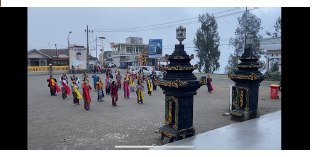Department of International Relations, BINUS University is empowering Society and Advancing SDGs in Batu Cermin, Labuan Bajo, and Wonokitri, Pasuruan. Project Code: ES00863
Department of International Relations, BINUS University Empowers Society and Advances SDGs in Batu Cermin and Wonokitri
Empowering Local Communities for Sustainable Development
BINUS University empowers SDGs in Batu Cermin and Wonokitri through training, digital empowerment, and SDG-focused community initiatives.
This project reflects BINUS University’s strong commitment to the United Nations Sustainable Development Goals (SDGs).
It aims to strengthen education, economic growth, innovation, peace, and global partnerships.
Held in Batu Cermin, Labuan Bajo, and Wonokitri, Pasuruan, the initiative focuses on empowering local communities while promoting inclusive development.
Collaboration for Local Empowerment
From July 21 to July 26, 2024, the Empowering Society project was carried out in collaboration with the Geospatial Information Agency (BIG) and BAPPENAS.
Through this collaboration, BINUS University supported sustainable community growth by combining academic knowledge and government partnership.
Moreover, the project used geospatial data and paradiplomatic strategies to strengthen local businesses and tourism potential.
As a result, the initiative helped local MSMEs (micro, small, and medium enterprises) identify and overcome development challenges.
Activities and Key Achievements
Mapping Local Potentials and Challenges
The project began with surveys and focus group discussions (FGDs).
During these sessions, participants identified tourism opportunities and local challenges.
For example, Batu Cermin’s rock formations and Wonokitri’s cultural attractions were recognized as valuable assets.
However, issues like limited infrastructure and low market access remained key barriers.
Capacity Building for MSMEs
Workshops were held to improve business management, financial planning, and digital marketing skills.
Additionally, participants learned how to access funding opportunities and align their efforts with the One Village One Product (OVOP) strategy.
Sustainable Tourism Development
Training sessions focused on developing eco-friendly homestays and cultural tourism.
Participants also learned to design environmentally sustainable products and manage tourism events.
Therefore, these programs enhanced local readiness to attract responsible tourism.
Geospatial Data Utilization
The program introduced geospatial tools for planning and zoning.
Participants practiced mapping tourist areas and identifying safe, accessible routes for visitors.
This knowledge improved both local infrastructure planning and disaster risk awareness.
Digital Transformation
BINUS University also provided digital training in social media, website creation, and e-commerce.
Consequently, participants were able to improve the visibility of their products and reach broader markets online.
Aligning with the SDGs
The project’s focus on digital literacy, community engagement, and economic empowerment reflects its alignment with several SDGs:
- Goal 4: Ensuring inclusive and equitable education by training local MSMEs.
Photo: Training on Business Strategy and Digital Marketing in Batu Cermin Village
- Goal 8: Promoting sustainable economic growth by enhancing local tourism and entrepreneurship.
Local Tourism in Wonokitri, Pasuruan
- Goal 9: Leveraging geospatial data to improve infrastructure and foster innovation.
- Goal 16: Building inclusive and peaceful communities through collaborative development models.
- Goal 17: Strengthening global partnerships for local progress.
Community Impact and Future Plans
The program brought meaningful change to Batu Cermin and Wonokitri.
Participants gained confidence in using digital tools and applying new business strategies.
In addition, local tourism now benefits from stronger branding and infrastructure plans.
Moving forward, BINUS University will continue to guide both communities through mentorship and digital financial management programs.
This continued support ensures the long-term sustainability of local economic growth.
Conclusion
BINUS University empowers SDGs in Batu Cermin and Wonokitri by combining education, innovation, and collaboration.
Through the Empowering Society initiative, BINUS strengthens community capacity, promotes digital transformation, and advances sustainable development.
Ultimately, this project demonstrates how education and partnerships can build inclusive, empowered, and sustainable local communities.









Comments :